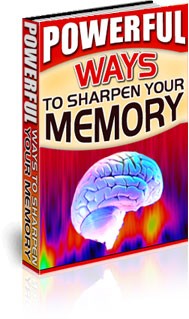 License Type: Private Label Rights
License Type: Private Label Rights  File Size: 922 KB
File Size: 922 KB File Type: ZIP
File Type: ZIP
 SKU: 21882
SKU: 21882  Shipping: Online Download
Shipping: Online Download
Ebook Sample Content Preview:
"The existence of forgetting has never been proved: We only know that some things don't come to mind when we want them,” Friedrich Nietzsche once said.
Being forgetful causes a lot of anxiety in people today, especially with the increasing awareness of memory-related diseases like Alzheimer’s. On the other hand, new studies show that the human mind, not traumatized by serious injury or disease, never forgets. Experts say forgetting is not akin to losing information, but more so because there might be slip-up in the way the information was stored or in the way it is being retrieved.
But then, if the problem really lies on information-gathering and retrieval, why do most of us still tend to forget, no matter how hard we rack our brains? We forget where we put those keys, that much-needed item in the grocery list, or worse, those very important answers in an exam that might spell the difference between a passing mark and a failing grade.
A variety of factors contribute to the way our brain stores and supplies information. Although schools of thought and psychology are still debating on how the human mind works, they agree for one thing that memory is affected by our overall experience - from our genes, to the kind of childhood we had, down to the food we ate for breakfast this morning.
Some scientists liken the mind to a video camera because of its ability and nature to record everything a person experiences. Thus, looking for a particular event in your past is similar to searching for a scene in a video footage: a person can select the target scene, view it in slow motion or fast forward, even pause or zoom in to a particular detail. It is from this view that techniques to retrieve memory using hypnosis, truth serum, meditation, therapy and other similar forms come from.
On the other hand, despite the mind’s "videographic” eye, it was discovered that the mind does not have perfect archival properties, similar to a videotape that can gather mildew, lose sharpness, and age over time. The brain is also likened to a computer chip. While it may hold very large amount of information, its capacity to store data nevertheless has its limitations.
- File Size:922 KB
- License: Private Label Rights
- Category:Ebooks
- Tags:2008 Ebooks Private Label Rights








